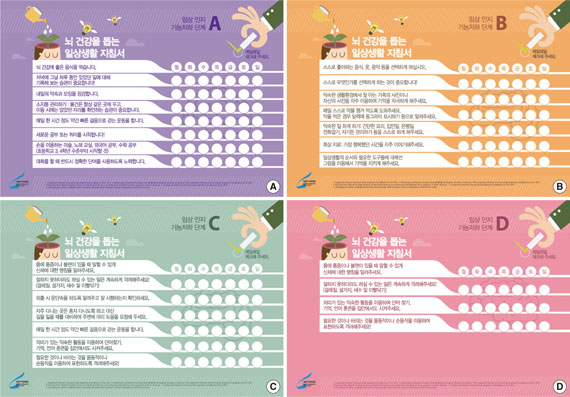Abstract
Background
Activities daily living (ADL) disability has a direct influence on the patients' quality of life and on the amount of care needed. It is major factor of care in dementia patients. So Korean Dementia Association suggested guideline about activities of daily living in dementia patients in 2013. The purpose of this article is to investigate the effect of this.
Methods
A total of 110 subjects were enrolled. Assessments included age, sex, education level of patients and caregiver, the duration of disease, pattern of family, economic status. We divided "active practice" group and "passive practice" group by recognition of guideline contents after study. We compared two groups before and after by Korean Mini-Mental State Examination (K-MMSE), Short form of Geriatric Depression Scale-Korean version (S-GDS), Korean version of Zarit's Burden Interview (ZBI-K), Alzheimer's Disease Cooperative Study-Activities of Daily Living scale (ADCS-ADL). Finally, we investigate the level of satisfaction about our guideline.
Results
Age of patients, the duration of disease was lower and education level of caregiver and economic status was higher in "active practice group". The pattern of family also differed from two groups. It was observed distinct difference between the variations of two groups in S-GDS, ZBI-K, and ADCS-ADL. The level of satisfaction about our guideline was very high.
Figures and Tables
Table 2
Compared the state of patients and caregiver before and after using guideline

*Active="active practice" group of guideline; †Passive="passive practice" group of guideline.
K-MMSE, Korean Mini-Mental State Examination; S-GDS, Short form of Geriatric Depression Scale, Korean version; ZBI-K, Korean version of Zarit's Burden Interview; ADCS-ADL, Alzheimer's Disease Cooperative Study-Activities of Daily Living scale.
References
1. Yang Y, Yang HD, Hong YJ, Kim JE, Park MH, Na HR, et al. Activities of Daily Living and Dementia. Dement Neurocogn Disord. 2012; 11:29–37.

2. American Psychiatric Association. Diagnostic and Statistical Manual of Mental Disorders DSM-IV-TR (Text Revision). 4th ed. Washington DC: American Psychiatric Association;2000.
3. Rubin EH, Morris JC, Grant EA, Vendegna T. Very mild senile dementia of the Alzheimer type. I. Clinical assessment. Arch Neurol. 1989; 46:379–382.
4. Juva K, Makela M, Erkinjuntti T, Sulkava R. Functional assessment scales in detecting dementia. Age Ageing. 1997; 26:393–400.

5. Desai AK, Grossberg GT, Sheth DN. Activities of daily living in patients with dementia: clinical relevance, methods of assessment and effects of treatment. CNS Drugs. 2004; 18:853–875.

6. Thal LJ, Grundman M, Klauber MR. Dementia: characteristics of a referral population and factors associated with progression. Neurology. 1988; 38:1083–1090.

7. Galasko D, et al. An inventory to assess activities of daily living for clinical trials in Alzheimer's disease. The Alzheimer's Disease Cooperative Study. Alzheimer Dis Assoc Disord. 1997; 11:Suppl 2. S33–S39.
8. Gauthier S, Rockwood k, Gelinas I, Sykes L, Teunisse S, Orgogozo JM, et al. Outcome measures for the study of activities of daily living in vascular dementia. Alzheimer Dis Assoc Disord. 1999; 13:Suppl 3. S143–S147.

9. Mohr E, Feldman H, Gauthier S. Canadian guidelines for the development of antidementia therapies: a conceptual summary. Can J Neurol Sci. 1995; 22:62–71.

10. Choi H, Yang YS, Kim H, Na HR, Shim YS, Park KW, et al. The Survey for Current State and Dognition of Activities of Daily Living in Dementia Patients- "Il-sang-ye-chan" Campaign. Dement Neurocogn Disord. 2013; 12:47–51.

11. Choi SH, Na DL, Lee BH, Hahm DS, Jeong JH, Yoon SJ, et al. Estimating the Validity of the Korean Version of Expanded Clinical Dementia Rating (CDR) Scale. J Korean Neurol Assoc. 2001; 19:585–591.
12. Kang Y, Kim D, Na DL. A normative study of the Korean Mini-Mental State Examination. J Korean Neurol Assoc. 2003; 22:Suppl 3. 235.
13. Bae JN, Cho MJ. Development of the Korean version of the Geriatric Depression Scale and its short form among elderly psychiatric patients. J Psychosom Res. 2004; 57:297–305.

14. Zarit SH, Todd PA, Zarit JM. Subjective burden of husband and wives as caregivers: a longitudinal study. Gerontologist. 1986; 26:260–266.

15. Galasko D, Bennett D, Sano M, et al. An inventory to assess activities of daily living for clinical trials in Alzheimer's disease: the Alzheimer's Disease Cooperative Study. Alzheimer Dis Assoc Disord. 1997; 11:Suppl 2. S33–S39.
16. Lee Y, Na DL, Cheong H, Hong CH, Back JH, Kim J, et al. Lifestyle Recommendations for Dementia Prevention: PASCAL. J Korean Geriatr Soc. 2009; 13(2):61–68.

17. Saczynski JS, Pfeifer LA, Masaki K, Korf ES, Laurin D, White L, et al. The effect of social engagement on incident dementia: the Honolulu-Asia Aging Study. Am J Epidemiol. 2006; 163:433–440.
18. Hultsch DF, Hertzog C, Small BJ, Dixon RA. Use it or lose it: engaged lifestyle as a buffer of cognitive decline in aging? Psychol Aging. 1999; 14:245–263.





 PDF
PDF ePub
ePub Citation
Citation Print
Print






 XML Download
XML Download